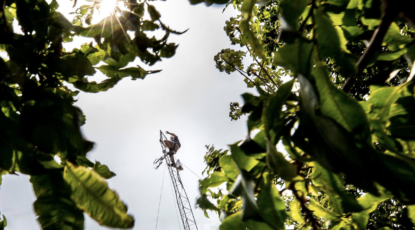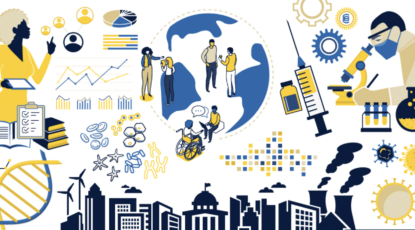Innovation
-
Dementia’s toll on US
U-M study shows major gaps in who gets care that could help them remain at home. Black, low-income, or people with lower levels of education are less likely than their counterparts to have available spouse caregivers, but more likely to have adult children available to provide care.
-
XR technology ‘brings’ conference goers to iconic U-M space
As the Center for Academic Innovation prepared for its first annual XR Summit, organizers had an idea: create a virtual representation of the Diag for people to meet, using the technology that was the focus of the event. So cool.
-
Thurnau Professor behind weather data tools wins U-M innovation award
Perry Samson, professor of climate and space sciences and engineering, has pioneered a series of learning and weather-related tools and technologies, and has launched companies around them that serve millions.
-
First-responder robots could team with wildfire fighters
A three-year project funded by a $1 million grant aims to equip bipedal walking robots with the technology to trek in areas that are too dangerous for humans, including collapsed buildings and other disaster areas.
-
‘PrivacyMic’: For a smart speaker that doesn’t eavesdrop
U-M researchers have developed a system that can inform a smart home – or listen for the signal that would turn on a smart speaker – without eavesdropping on audible sound. Phew! We can finally stop whispering all the time.
-
Data is life: Amazon holds clues about climate
Follow Michigan researchers deep into (and above) the Amazon as they collect data, day by day and tree by tree, that could drive a better understanding of the Earth’s climate future.
-
Snails help solve mystery with world’s smallest computer
U-M scientists using a computing system so tiny it can stick to a snail’s shell recently collected data ‘that nobody had been able to obtain’ before. Evolutionary biologists are using the miniaturized sensing computers to understand how to preserve and protect endemic species.
-
Good science changes: That’s a good thing
Throughout history, the process of discovery has always involved correcting mistakes, clarifying our understanding, and adding deeper shades of nuance. These changes in our knowledge are features of science, not bugs.
-
Trapping ocean microplastics
Some 8 million tons of plastic trash enter the ocean each year, most of which is battered into microplastics. U-M researchers can now spot these harmful flecks, tracking where they enter the water, how they move, and where they tend to collect around the world.










